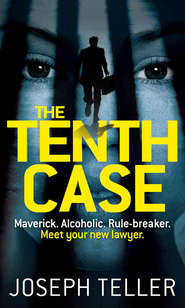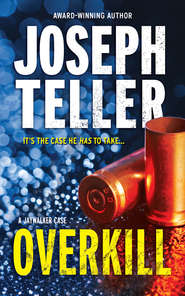По всем вопросам обращайтесь на: info@litportal.ru
(©) 2003-2024.
✖
Bronx Justice
Автор
Год написания книги
2018
Настройки чтения
Размер шрифта
Высота строк
Поля
“Jay, that’s my son, you see? You got to do what you can for him. He didn’t rape anybody. I don’t care what it costs, I’ll get the money somehow. But you got to help him.”
“I’ll help him,” said Jaywalker.
They spent the next hour and a half in the courtroom, waiting for the arrival of Joanne Kenarden, the victim who was named in the complaint. Jaywalker passed the time watching the parade of arraignments, people who’d been arrested the previous night. An assault, his own head bandaged. A gypsy cab stickup. Four for possession of heroin. A gun. A homicide, a man who’d beaten his two-year-old stepson to death. Almost all were black or Hispanic. In almost every case the judge set high bail and the defendant was walked back into the pen area, out of sight. Family members, who’d moved forward to the railing to hear better and perhaps be noticed, straggled out of the courtroom, sometimes sobbing, sometimes angry, always confused.
It was a quarter past twelve when Joanne Kenarden showed up. She poked her thin face into the courtroom and looked around uncertainly. Something in Jaywalker told him it was her even before Detective Rendell spotted her, stood up and walked over to her. Jaywalker watched them as they spoke briefly at the door. Then Rendell found her a place to sit, had her sign some papers, motioned her to wait and left the room.
Jaywalker moved his own seat in order to get a better look at her. She was pretty, if a bit hard-looking. The thinness of her face and body made guessing her age difficult. Thirty, maybe. She was dressed in inexpensive clothes, jeans and a black top, but carefully. And she was white.
When Rendell came back into the courtroom, Jacob Pope was with him. While Pope took a seat up front, Rendell disappeared into the pen area. When he emerged several minutes later, he was leading Darren by the arm. Today that act itself would be called a suggestive identification procedure; back then, it was simply how things were done. In any event, as soon as she saw Darren, Joanne Kenarden stiffened visibly in her seat and nodded almost reflexively. To Jaywalker’s eye, her response seemed involuntary and genuine. He wondered if Pope had caught it.
“Docket number X974513, Darren Kingston,” called the bridgeman, his title derived from his position between the judge and the rest of the courtroom. “Charged with rape, on the complaint of Joanne Kenarden. Detective Rendell.” Shielding rape victims’ identities didn’t happen back then, either.
Jaywalker rose, made his way forward and took his place at the center of a long wooden table in front of the judge’s bench. To his left stood Darren, hands cuffed in front of him, a uniformed court officer immediately behind him. To Jaywalker’s right stood Jacob Pope, Detective Rendell and Joanne Kenarden.
“Miss Kenarden,” said the bridgeman, “do you swear to the truth and contents of your affidavit?” In 1979, there was no such thing as a Ms. You were Miss, or you were Mrs.
“I do.”
“Counselor, do you waive the reading of the rights and charges?”
“Yes,” said Jaywalker, “we do.”
The judge, a fairly recent appointee named Howard Goldman, turned to Pope, waiting for his bail recommendation. Pope responded by describing the Kenarden rape and sodomy, emphasizing the knife. He pointed out that there were four additional rape victims, and added that it had taken the police several weeks to locate the defendant once he’d been identified. The clear implication was that Darren would be likely to flee if released. “Accordingly,” Pope concluded, “the People request that bail be set in the amount of fifty thousand dollars.”
It was Jaywalker’s turn. He pointed to Darren’s family in the courtroom, described Darren’s job and theirs, and mentioned the lack of any prior convictions. He stressed Darren’s wife, their child and her pregnancy. He said that he’d known the family for almost two years and felt privileged to have done so.
“I consider these very serious charges,” said Judge Goldman.
“So do I,” Jaywalker agreed. “I also consider it very possible that this is the wrong man.”
Goldman turned toward Joanne Kenarden. “Young lady,” he said, “I want you to answer me truthfully. Is there any doubt in your mind, any doubt whatsoever, that this is the man who attacked you? Take a good look at him before you answer me.”
Jaywalker took a step back so that she could get a better look at Darren. But even as he did so, he knew it was a futile gesture. They were enacting a charade, after all. Not twenty minutes earlier, having seen Darren led into the courtroom by Detective Rendell, she’d put her signature on an affidavit, swearing that this was the man who’d raped and orally sodomized her. What was she supposed to say now, that she’d changed her mind?
“No doubt whatsoever,” she said.
“Bail is fifty thousand dollars,” said the judge.
Out of the corner of his eye, Jaywalker could see Darren’s shoulders sag, notice him shake his head slowly from side to side. The case was adjourned one week, for a preliminary hearing. But Jaywalker knew there would be no hearing. Pope would present his case directly to a grand jury, who would listen to Joanne Kenarden, and perhaps the other victims as well, and vote an indictment. Jaywalker toyed briefly with the idea of having Darren testify at the grand jury, but quickly rejected it. All Darren could say was that he was innocent. Having him do so, and then exposing him to cross-examination at this early stage, would accomplish little and risk much.
“Anything else?” asked the judge.
“No,” said Jaywalker.
“Next case.”
Less than ten minutes after it had begun, the arraignment was over. Darren was led back into the pen from which he’d come.
Outside on the sidewalk, Jaywalker explained the bail to Darren’s parents. In order to get their son out of jail, they would either have to come up with fifty thousand dollars in cash or go to a bondsman, who would require maybe half that much, as well as the balance in property—bank-books, jewelry, deeds to buildings or similar collateral. Marlin Kingston shook his head in disbelief, or maybe despair. Jaywalker told him they had an option, to let a few days pass and then go over to the Supreme Court building on the Grand Concourse, where they could make an application to get the figure reduced.
He kissed Inez goodbye, something he didn’t ordinarily do. Perhaps it was her own warmth, radiating outward, that compelled him to do so. When he went to shake Marlin’s hand, he felt something pressed against his palm.
“What’s this?” he asked.
“A hundred dollars,” said Marlin. “For today.”
“No,” said Jaywalker. “You save it. You’re going to need every penny to try to get Darren out.” But he realized he was only getting to know this little man, who could cry unashamedly one minute and fight like a warrior the next, when Marlin spoke again.
“This is yours, Jay,” he said. “Darren is my son. I’ll get him out somehow. Don’t you worry.”
Jaywalker pocketed the money. It was 1979, and he couldn’t afford to sneeze at a hundred dollars. Not with a wife, a child of his own, a mortgage and a stack of bills. But he did worry. If a hundred dollars was nothing to sneeze at, what did that say about fifty thousand?
3
EIGHTY YEARS
On Friday, Jaywalker got another call from Inez Kingston. “We bailed Darren out,” she said, “and I was wondering if you wanted to talk to him or anything.”
“You’re kidding!” Jaywalker couldn’t believe it.
“I’m not kidding. Marlin went out to Rikers Island last night to get him. They didn’t get back till three this morning, and I didn’t want to wake you. But he’s here now, if you want to talk to him.”
“Of course I do. Put him on.”
There was a pause, followed by Darren’s voice. “Hello, J-J-Jay.”
“Hey! How the hell are you?”
“P-p-pretty good, Jay.”
They spoke for a few minutes. Jaywalker told Darren he didn’t want him to be alone at all, whether he was indoors or out, that some responsible adult should be with him at all times. That way, if any more rapes were to occur, they would have an alibi, proof that it couldn’t be him. Darren said he would make sure of that. They made an appointment to meet at Jaywalker’s office on Monday. Jaywalker ended the conversation by telling Darren how happy he was.
“M-me, too, Jay.”
Jaywalker hung up the phone absolutely elated. He marveled at the way the Kingstons must have scraped together every cent they had, borrowed what they didn’t and put up their small house as collateral. But as happy as he was for them and Darren, he also had a selfish reason to be pleased. A defendant who can’t make bail has two strikes against him. His opportunities to sit down and discuss his case with his lawyer are limited in terms of time, place and privacy. He’s unable to assist in the legwork of investigating and preparing his case—visiting the scene of the crime, locating and rounding up witnesses, and helping out with a bunch of other details about which he, as the accused, may have the greatest knowledge. He loses his job or drops out of school, or both. As a result, he becomes a less compelling witness in front of the jury, and a less likely candidate for a lenient sentence in the eyes of the judge. Bail, and having the resources to post it, may not be the most obvious way the system discriminates between the rich and the poor, but it often becomes one of the most significant.
So Darren’s getting bailed out was as crucial as it was surprising. It was also, Jaywalker dared to hope, something of a good omen. The case had started out badly. The arrest, the disclosure of multiple rapes, the certainty of Joanne Kenarden’s identification and the setting of high bail had been one blow after another. Maybe the tide was beginning to turn. Maybe something else good would happen.
Nothing happened.
Had Jaywalker simply been deluding himself when he’d told Darren he wanted his movements monitored round-the-clock by a responsible adult? Had he been engaging in nothing but wishful thinking by pretending that Darren wasn’t the rapist, and that somehow five victims could all have misidentified him?
Or had he simply been doing what defense lawyers do, willingly playing along with a client’s insistence upon his innocence until the time was ripe to get real and face the unpleasant truth? In quiet moments that weekend, it surely seemed so.
On Monday afternoon, Darren showed up at Jaywalker’s office, accompanied by his father. They spent two hours together, a good part of it with Marlin banished to the waiting room. Admitting you were a rapist was hard enough, Jaywalker reasoned; admitting it in front of your father might border on the impossible. But to Darren, it seemed to make no difference. He continued to deny any knowledge of the rapes.
Jaywalker did his best to hide his disbelief. One victim could certainly be mistaken. Two, perhaps. Even three, however unlikely, was possible. But five?








